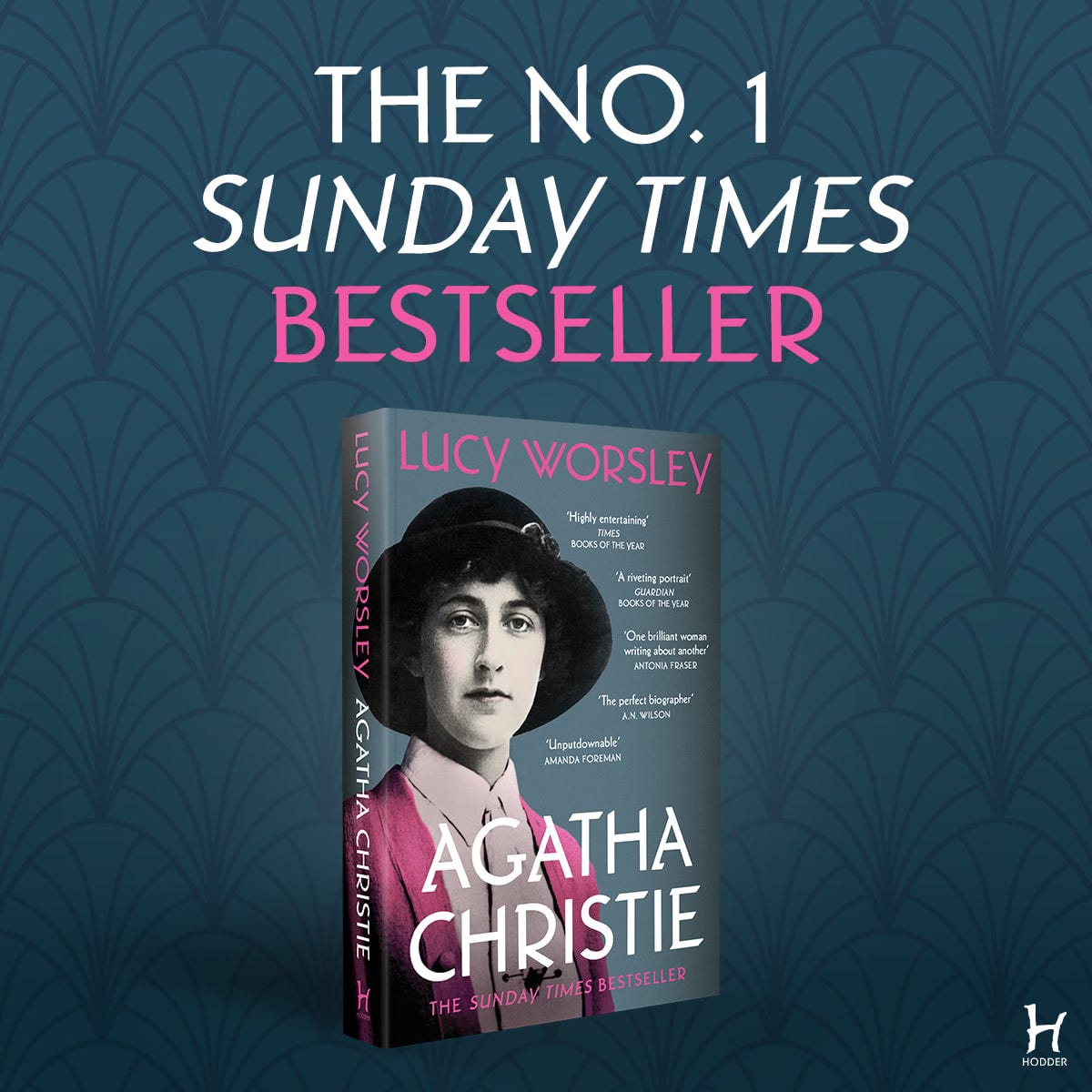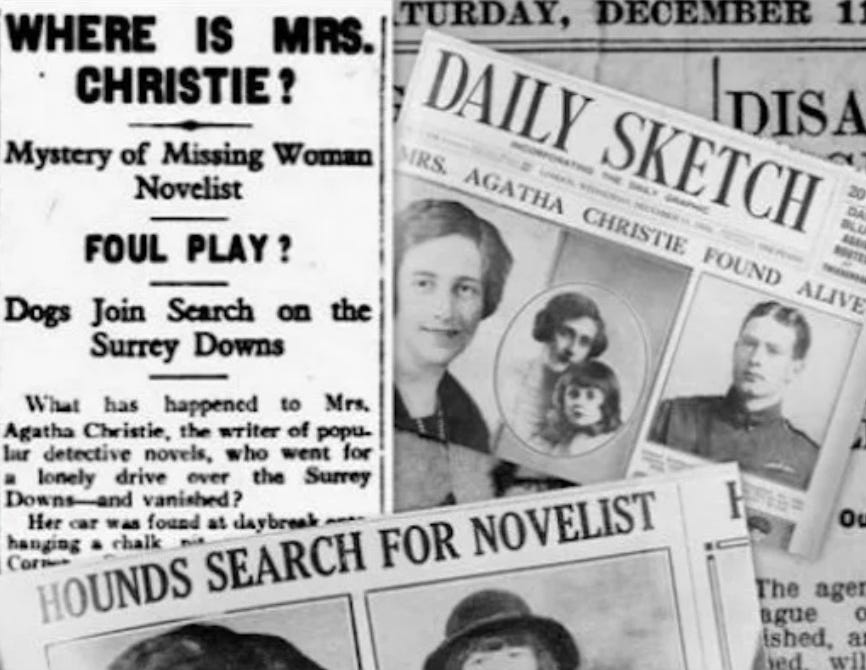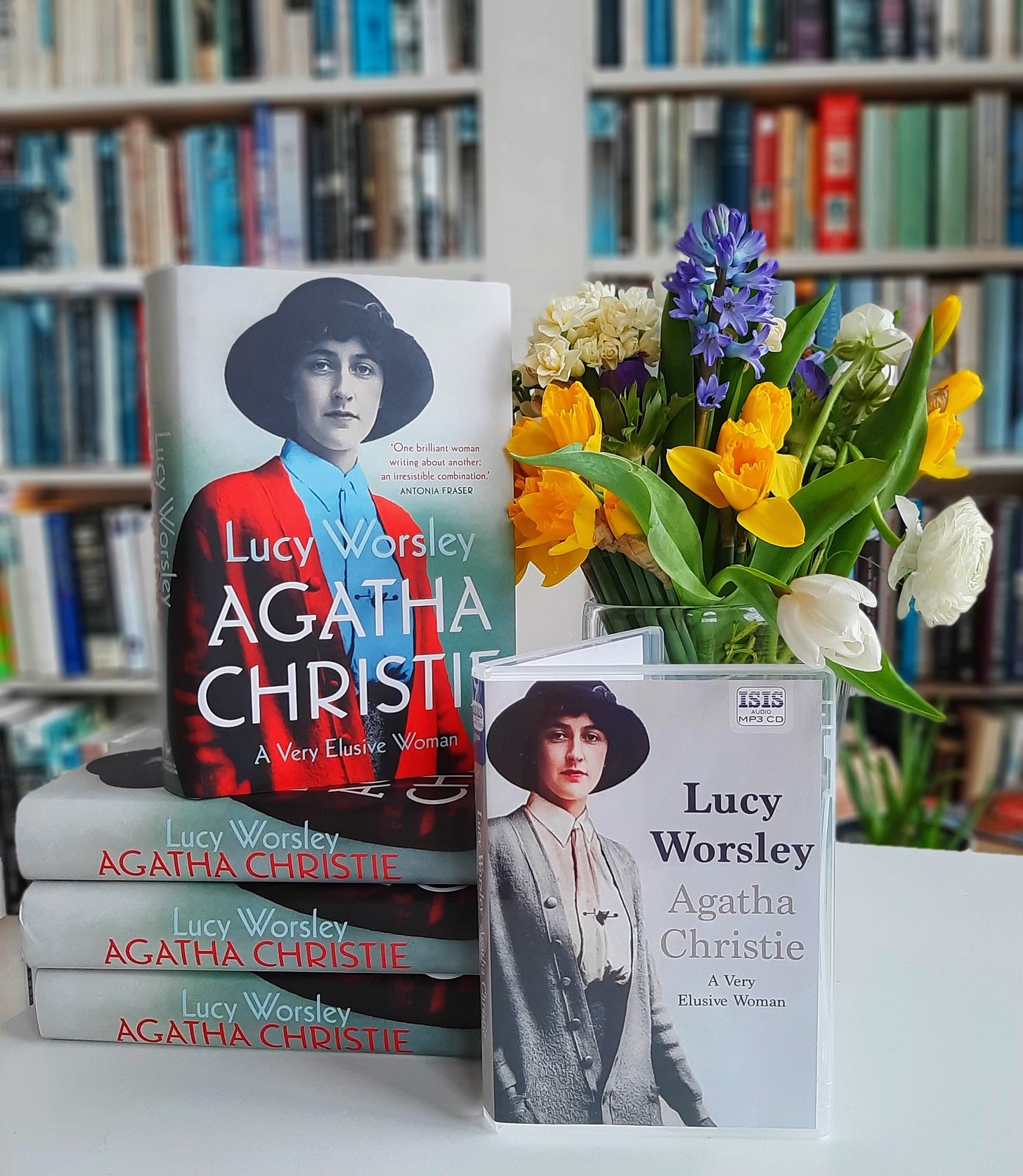The non-mysterious disappearance of Agatha Christie
I’ve had my own dreadful little dose of being publicly shamed, which might explain why I’m obsessed with the unfairness of what happened to Agatha Christie in 1926.
The ‘mystery’ of why she ‘disappeared’ for eleven days, and media speculation about that, would shape her image as a public figure for the rest of her life. It gave her a reputation as someone devious, secretive and cold.
But before we get into it: two quick reminders: firstly, that on Sunday, 7pm London time, I’ll be having a live video chat for paid subscribers with Top Historian Dan Jones discussing the Middle Ages. To join in, just make sure you’re a paid subscriber here:
And, if you enjoy this week’s post, you might like to know that my book AGATHA CHRISTIE, A VERY ELUSIVE WOMAN, is currently just 99p in the Amazon Kindle sale in the UK!
Back to Agatha. The ‘mystery’ is usually presented like this: on 3 December, 1926, she disappeared, for eleven days, causing a national woman-hunt.
Stories about the missing novelist were all over the papers.
At the end of the eleven days, she was discovered 200 miles from home, living under a false name in a hotel in Harrogate, Yorkshire.
At the time - and since the time - a lot of people believed that she’d disappeared deliberately. Perhaps to get more publicity for her books. Or, more excitingly, to frame her cheating husband with having murdered her.
When she was found alive and physically unharmed, the press turned on her. She was pilloried. You wouldn’t believe the abuse. It was almost like they were disappointed that she hadn’t been murdered!
You’ll often see it stated in books about Agatha Christie that after her disappearance, she never spoke about the subject again.
When I started researching my own biography of her, I’d been so brainwashed myself by this pop history version that I was rather shocked to discover that it’s not at all true.
In fact it’s almost comically untrue.
Because eighteen months later, in 1928, she gave a really long interview explaining her disappearance to none other than The Daily Mail. Yes, the paper read by millions!
The problem was, that no one listened to what she had to say.
And that’s because the story she tells in that interview is a story that’s hard to hear, because it isn’t about framing a cheating husband at all.
It’s about being mentally unwell.
In this interview, Agatha Christie explains she’d been so unwell that she’d made an attempt on her own life.
Having survived it, she’d fallen into what psychiatrists call a ‘fugue state’.
That’s a form of mental distress where you can do quite normal things, like go to Harrogate - which in the 1920s was a spa town, a place of wellness and healing - and check into a hotel.
But you can’t tell anyone who you are, or what your name is. Hence the false name, and the erratic behaviour.
A ‘fugue state’ is a way of protecting yourself, inside your mind, from a reality you find intolerable. In Agatha’s case, her mother’s death, the pressure of producing her next bestseller, and her husband’s affair had all became too much for her to cope with. She couldn’t bear her life as the bereaved, betrayed Mrs Agatha Christie. But perhaps she could go on living as someone else.
Part of the reason that she wasn’t believed, I think, is because in the 1920s ‘fugue state’ was a kind of culture war issue.
The soldiers of World War One who had what was called ‘shell shock’ often experienced fugue states, or memory loss.
But this was a condition that often got the response of disbelief. People thought the shell-shocked were shirkers.
And they were eager to disbelieve Agatha Christie for other reasons too:
She was also a prominent example of working mum. When she disappeared, she left her child behind.
These things subtly counted against her. She’d ridden high, now she must be brought low.
In 1926, Agatha said nothing in public. So why did she suddenly give that Daily Mail interview eighteen months later?
I’m pretty sure it was because by 1928 she was in the divorce court. She was desperate to get custody of her daughter, and she knew she had to try to change the narrative.
The most important part of the interview, to my mind, is where she says that she’d been terribly ill - but that she’d never, ever, have hurt her child.
She wanted to make the point that she wasn’t the ‘bad mother’ the judge had read about in the papers.
Agatha did get custody of her daughter.
But at what cost to her pride, and to her privacy, to have felt forced to go public about such personal things.
After the events of 1926, she became incredibly reluctant to give media interviews, and adopted what I perceive to be a deliberate strategy of belittling herself, and downplaying her enormous achievements.
That’s why, despite her fame, and her success, and her later happiness, I’ve still got a sense of unfinished business about the life of Agatha Christie.
I think she experienced a backlash against the new prominence of women like her in public life in the 1920s, and in consequence, I think the press created a false narrative about her being a bad, tricksy, difficult woman.
And it persists to this day when people talk about the ‘mystery’ of her disappearance, rather than naming it, as she did herself, as an episode of devastating mental illness.
What do you think, my fellow sleuths?
And don’t forget, for the vast sum of 99p, AGATHA CHRISTIE A VERY ELUSIVE WOMAN is in the Kindle sale for this month! (in the UK at least!)















